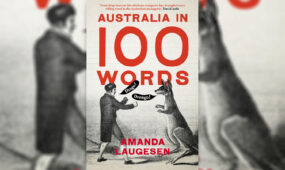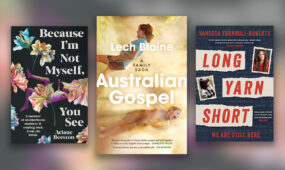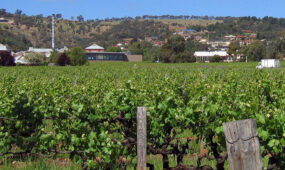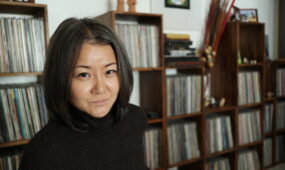Discovering the world’s most beautiful bookshops
Books & Poetry
It was love at first sight. She was exotic, mysterious and full of stories. Some as old as Homer.

I had travelled 14,000 kilometres, through innumerable airport scanners and wifi-less hotels, just to find her.
My destination was the Atlantis Books on the Greek island of Santorini. A white-washed cave full of the best modern, classical and ancient literature.
Books are shelved high to a dome ceiling. In an antechamber, a cat rests its head on a tome of ancient Greek architecture. There’s a babble of foreign tongues as tourists gather to buy that special book.
Outside the bookshop, a terrace overlooks the impossibly blue Aegean Sea. Here in time immemorial, the Greek fleet sailed past to get Helen back from the amorous arms of Paris in Troy. There were tears. Big-time.
I am a bookshop philanderer, who between watching my true love, Port Power, promise so much but deliver so little, scrimps and saves to travel the world in search of books and bookshops. This story is a homage to them.
As sales of e-readers flattens, bookshops are making a third-quarter comeback. In a world of mediated electronic friendships and multi-media extravaganzas, the humble book stands for authenticity.
Book sales in the UK and US bounced back in 2015 and two of the world’s most famous bookshops, The Strand in New York and Foyles in London, turned in solid profits.
In the last 10 years, Australian bookshops have been hit hard by the growth of e-readers and the anti-competitive behaviour of Amazon. Even so, sales of Kindles peaked in 2011 and have flatlined since.
While Amazon and The Book Depository (also owned by Amazon) can undercut counter prices, their algorithms can’t provide personal service or inside tips such as, “if you like that book, you really ought to read this”.
Their computer codes can’t deliver the sensual experience of letting the eyes wander across a riot of colourful book spines.
Don’t underestimate the transformative power of entering a beautiful bookshop. Clock time or “chromos” dissolves into “kairos” or personal time. The time of meditation, revery and serendipity.
Bookshops are to bibliophiles, what lolly shops are to kids.

A place for revery – Atlantis Books’ resident cat. Photo: Malcolm King
In Australia, the real threat to the entire value chain – from writer and publisher to bookseller and consumer – is not from technology but from proposed changes to Australia’s copyright laws.
A recent draft Productivity Commission report suggested that an author’s period of copyright should last only 15 to 25 years from the creation of the work, rather than the current 70 years from the year the writer dies.
If this occurred, Adelaide author Hannah Kent might lose the rights to her extraordinary first novel Burial Rights, published in 2013, in the year 2028. She would be just 44 years old. An author’s rights should last the lifetime of the creator.
While the suggestion created an outcry among many authors, Minister for the Arts Mitch Fifield has since stated that the Government does not intend to reduce the copyright period in this way, and that the claim was based on a “finding”, not a “recommendation”, in “draft” Productivity Commission report.
The Productivity Commission draft report has also raised concerns, however, that cheap foreign editions of books will be allowed to flood the domestic market. We need more pulp fiction like a chocolate teapot needs hot water.
The good news is that sales of kids’ books in Australia are going through the roof. Why? Kids like the way picture books look and smell.
For crusaders of authenticity – and for adults who also like the way books look and smell – Shakespeare & Co, near Notre Dame in Paris, is one of the best English-language bookshops in Europe. Ernest Hemingway, F Scott Fitzgerald and Henry Miller rubbed shoulders and egos there.

Shakespeare and Co bookshop in Paris. Photo: Hannah Swithinbank / flickr
In Athens, look no further than the back streets of the old Monastiraki Area, where you’ll find old works of the great Greek poet CF Cavafy, whose poem Waiting for the Barbarians could have been written about Adelaide’s dire political culture.
In Berlin, catch the metro to St Georges Bookshop in Prenzlauer Berg. It has the best collection of new and used English books in town. Prenzlauer Berg is like Kensington Gardens but with young people, bars and live music.

Get InReview in your inbox – free each Saturday. Local arts and culture – covered.
Thanks for signing up to the InReview newsletter.
Closer to home, Imprints in Hindley Street is one of Australia’s best bookshops. It sells a smorgasbord of works across the subject spectrum. It’s the heart and soul of literary Adelaide.
A couple of years ago, the National Geographic voted Atlantis Books in Santorini the best bookshop in the world – and for sheer beauty, it is hard to beat.
For all of the homogenising forces of globalisation and the dumbing down of public discourse, there is sanctuary in a bookshop.
But beware, from books springs the tiger of imagination, lashing its tail in the light. Once that tiger is out, there’s no going back.
While the mediums and platforms of reading may change, nothing can quench the human desire for stories, no matter where you live.
Support local arts journalism
Your support will help us continue the important work of InReview in publishing free professional journalism that celebrates, interrogates and amplifies arts and culture in South Australia.
Donate Here





Comments
Show comments Hide comments